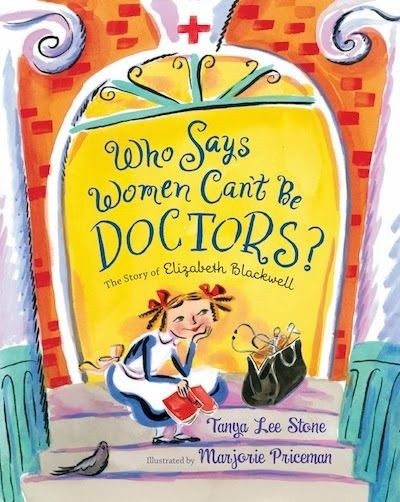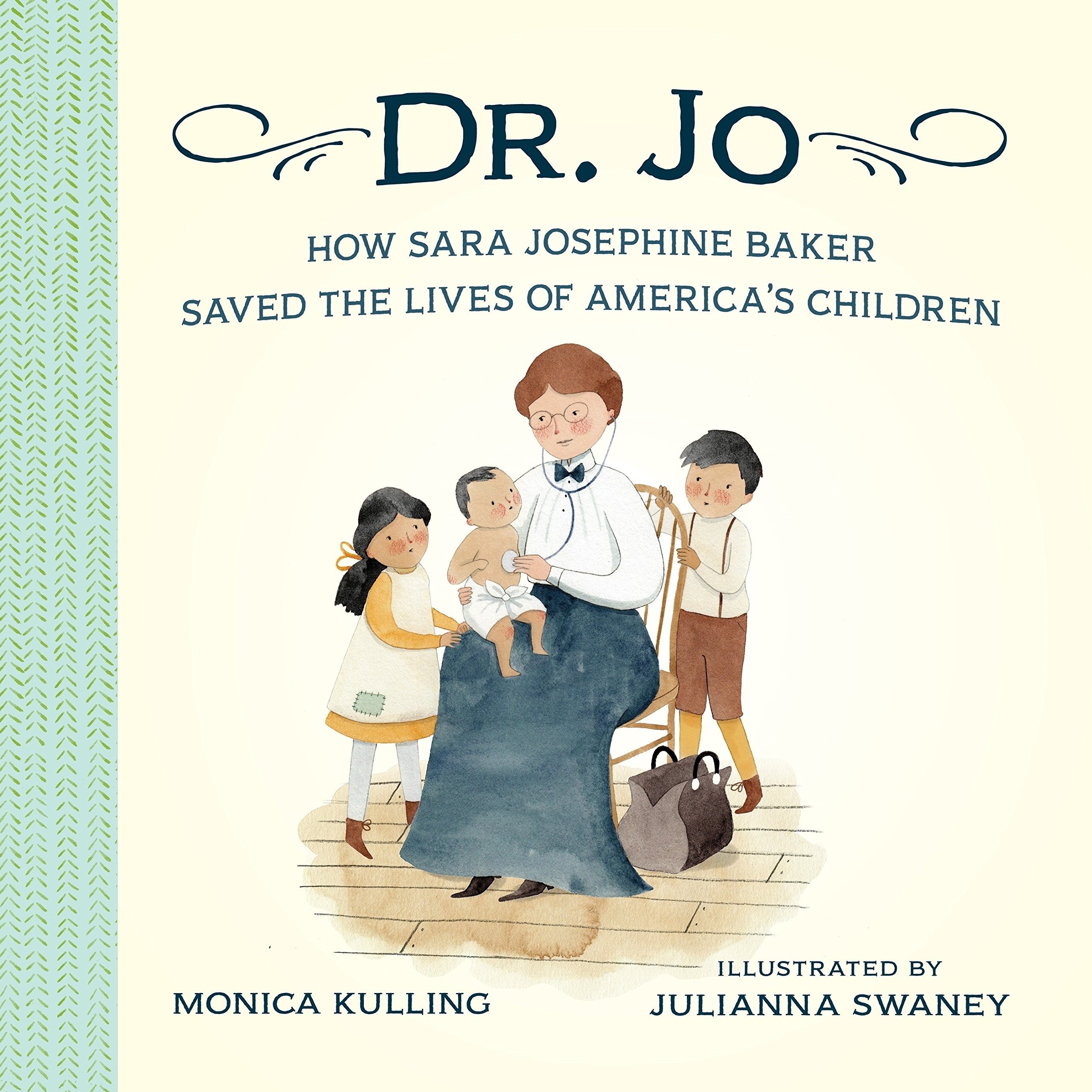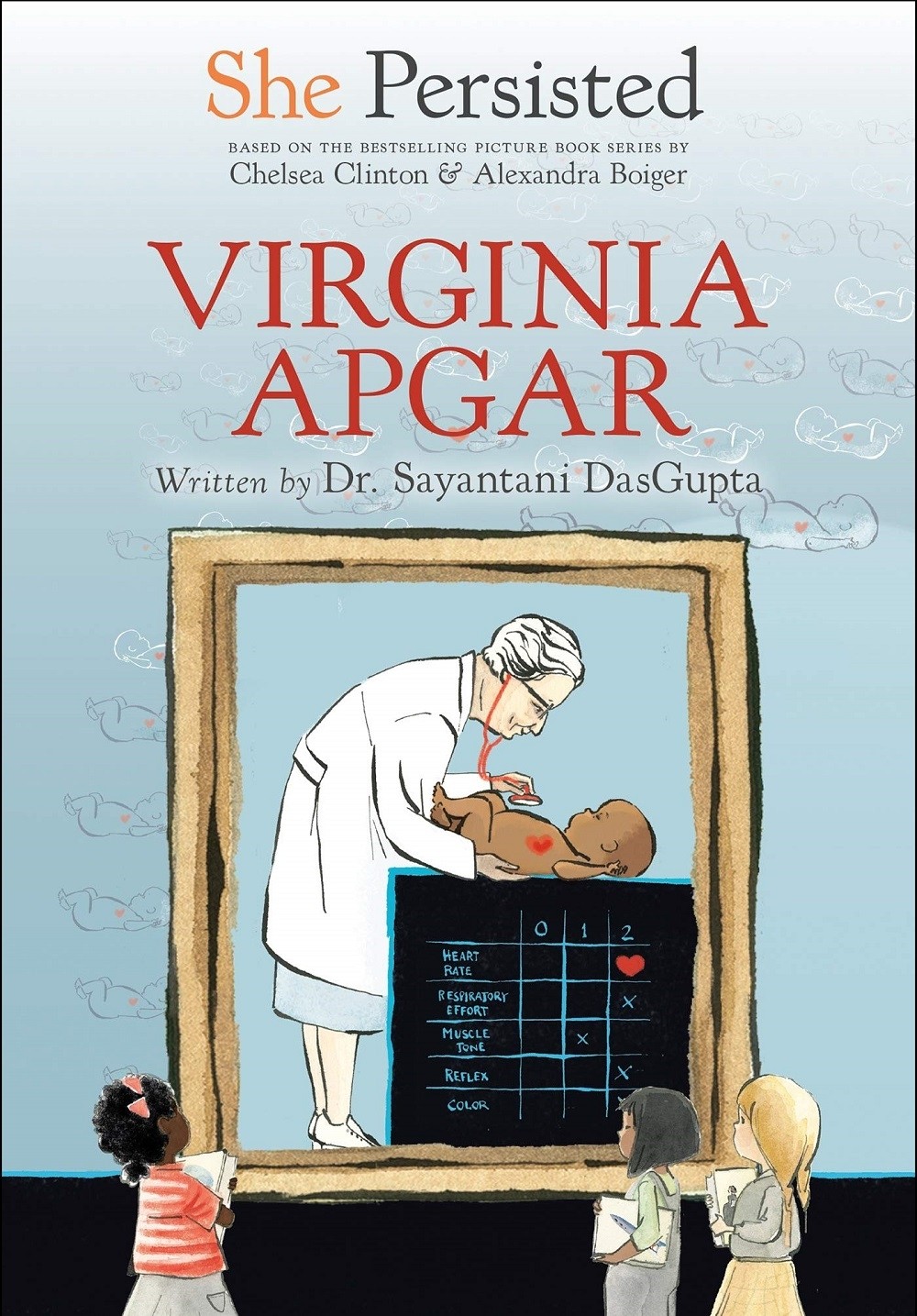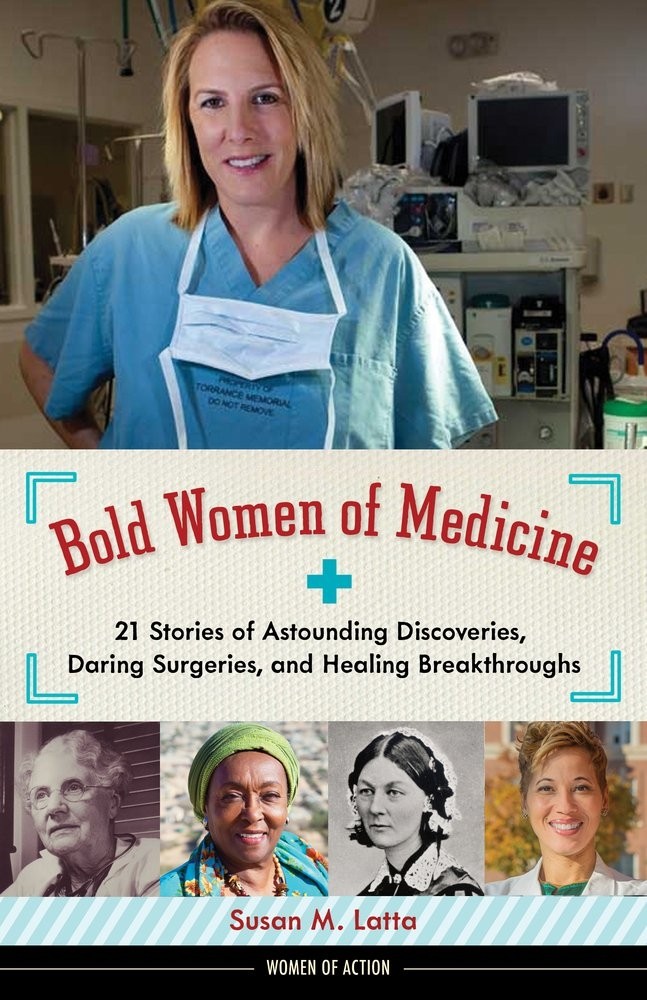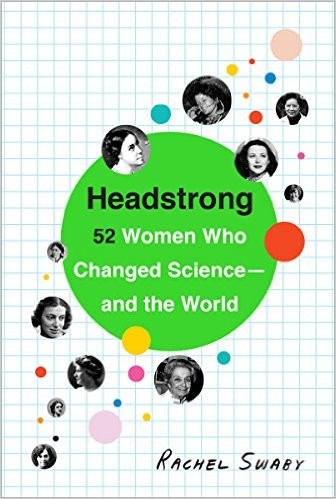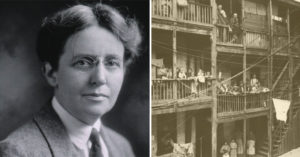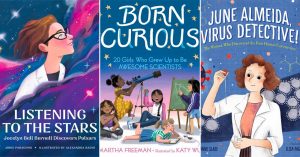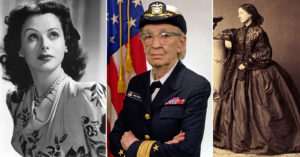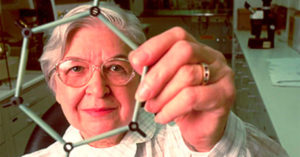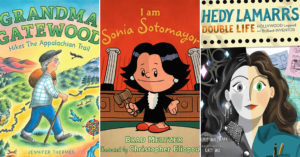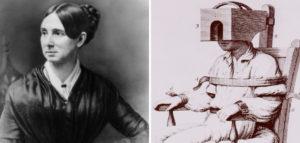"Nobody, but nobody, is going to stop breathing on me."
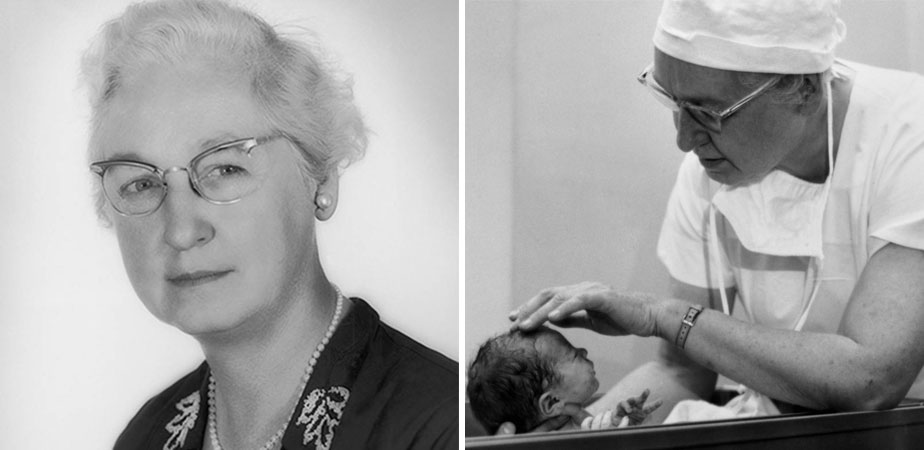 You've likely heard doctors or parents talking about a baby's Apgar Score, but did you know that this lifesaving measure is named for its creator, Dr. Virginia Apgar, the pioneering anesthesiologist whose work has helped save countless newborns? The Apgar Score, which is now used in many countries around the world, helps doctors quickly assess the health of newborns to determine if they need medical intervention. Apgar also authored a groundbreaking book called Is My Baby All Right? which provided parents with a reassuring and informative guide to birth defects, which had previously been a taboo topic and a source of shame to many families. Apgar's unflagging determination to provide the best possible care for both women and their babies is perhaps best summed up by her famous quote: "Nobody, but nobody, is going to stop breathing on me."
You've likely heard doctors or parents talking about a baby's Apgar Score, but did you know that this lifesaving measure is named for its creator, Dr. Virginia Apgar, the pioneering anesthesiologist whose work has helped save countless newborns? The Apgar Score, which is now used in many countries around the world, helps doctors quickly assess the health of newborns to determine if they need medical intervention. Apgar also authored a groundbreaking book called Is My Baby All Right? which provided parents with a reassuring and informative guide to birth defects, which had previously been a taboo topic and a source of shame to many families. Apgar's unflagging determination to provide the best possible care for both women and their babies is perhaps best summed up by her famous quote: "Nobody, but nobody, is going to stop breathing on me."
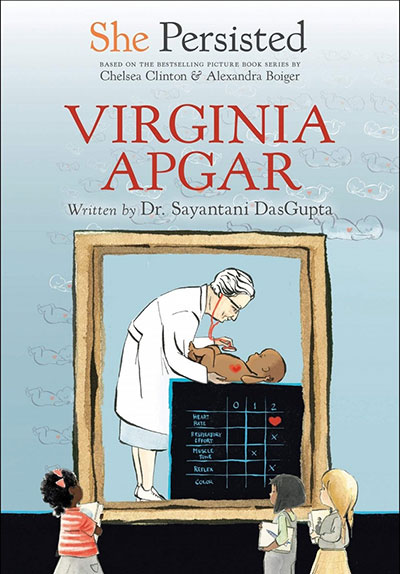 Born in Westfield, New Jersey on June 7, 1909, Apgar developed an interest in medicine by high school, where she performed poorly in her mandatory home economics classes but thrived in science and math. She completed an undergraduate degree at Mount Holyoke College in zoology with minors in physiology and chemistry — while also playing on multiple sports teams, reporting for the college newspaper, acting in local plays, and playing violin in the orchestra! It's no wonder that one of her teachers once remarked, "...frankly, how does she do it?"
Born in Westfield, New Jersey on June 7, 1909, Apgar developed an interest in medicine by high school, where she performed poorly in her mandatory home economics classes but thrived in science and math. She completed an undergraduate degree at Mount Holyoke College in zoology with minors in physiology and chemistry — while also playing on multiple sports teams, reporting for the college newspaper, acting in local plays, and playing violin in the orchestra! It's no wonder that one of her teachers once remarked, "...frankly, how does she do it?"
Apgar went on attend Columbia University College of Physicians and Surgeons (CUCPS) as one of nine women in a class of ninety students. She received her medical degree in 1933 and began a residency in surgery. Allen Whipple, the chairman of surgery at CUCPS, encouraged Apgar to switch to anesthesiology. Anesthetic had previously been given by nurses, but as surgeries became more complicated, anesthesiology was starting to become a doctor's specialty. However, the field was still new and poorly researched, and Whipple believed that Apgar had the enthusiasm, intelligence, and energy to take on the challenge. After receiving her anesthesiologist's certification in 1937, she returned to CUCPS to become the director of the newly formed division of anesthesia and, in 1949, she became the first female full professor in CUCPS' history.
Her position allowed her to conduct research at the affiliated Sloane Hospital for Women with laboring and new mothers. She soon realized that medical personnel had no standardized way to assess the health of newborn babies. Although mortality for children under a year old had been going down in the U.S. between the 1930s and 1950s, the rate of death among newborns had remained constant, in part because doctors weren't identifying babies who were at risk. In a 1953 paper, Apgar proposed a test to assess infant health on five criteria: heart rate, respiration, color, muscle tone, and reflex irritability. Within a few years, the test was becoming broadly adopted and had become known as the Apgar Score, a mnemoic learning aid based on its inventor's last name which stands for Appearance, Pulse, Grimace, Activity, Respiration. Due to its effectiveness and simplicity, the Apgar Score was widely used by hospitals throughout the United States by the 1960s, and is now used by doctors throughout the world.
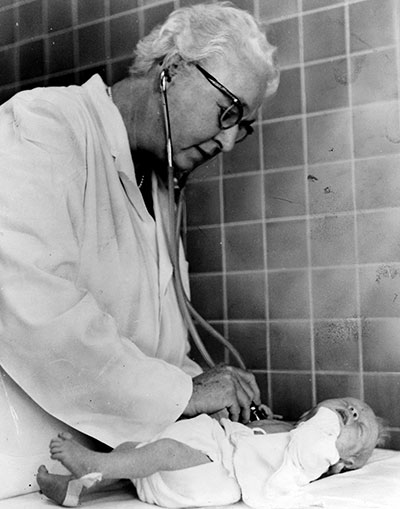 In 1959, Apgar left Columbia to pursue a Master of Public Health degree at Johns Hopkins University, and took a position at the March of Dimes Foundation directing its research into the prevention and treatment of birth defects. She was one of the first people at March of Dimes to bring attention to the role of premature birth as a significant cause of children's health issues; today, working to prevent premature birth is one of the foundation's top priorities.
In 1959, Apgar left Columbia to pursue a Master of Public Health degree at Johns Hopkins University, and took a position at the March of Dimes Foundation directing its research into the prevention and treatment of birth defects. She was one of the first people at March of Dimes to bring attention to the role of premature birth as a significant cause of children's health issues; today, working to prevent premature birth is one of the foundation's top priorities.
During the rubella or German measles pandemic of 1964 and 1965, when the United States had an estimated 12.5 million rubella cases, Apgar also advocated for universal vaccination to prevent mothers from transmitting the disease to their babies in utero. Now easily preventable with a vaccine that first became available in 1969, the devastating rubella pandemic led to tens of thousands of miscarriages, thousands of infant deaths, and tens of thousands of babies born with severe birth defects such as deafness and blindness.
Apgar published over 60 papers during her lifetime, and continued working and researching until her death in 1974. Since that time, Apgar has been recognized with multiple awards and honors, including a U.S. Postal Service stamp and induction into the National Women's Hall of Fame. Her influence lives on in the March of Dimes Foundation: during her time with the organization, she helped expand its focus to funding prenatal services for at-risk and under-served communities, as well as neonatal intensive care units for babies born prematurely. In a tribute to Apgar on the 100th anniversary of her birth in 2009, David Rose wrote, "Virginia Apgar was an irrepressible and charismatic champion for babies whose wit and lively personality captivated everyone she encountered in her constant quest for improvements to maternal and infant health.... It has been said that every baby is first seen through the eyes of Virginia Apgar."
Books About Virginia Apgar And Pioneering Female Doctors
Who Says Women Can't Be Doctors?: The Story of Elizabeth Blackwell
Who Says Women Can't Be Doctors?: The Story of Elizabeth Blackwell
Elizabeth Blackwell didn’t want to be a wife, or a teacher, or a seamstress: she wanted to be a doctor! But in the 1830s, that just wasn't something women did. Elizabeth wasn't swayed, though: when people told her she wasn’t smart enough, or strong enough, she knew better. She fought her way past detractors and skeptics to attend medical school, and not only was she the first woman to graduate from a medical degree in the US, she became the first woman to join the UK Medical Register. Her brilliant career would become an inspiration for generations of women after her. With its colorful art and inspiring tone, this is sure to be a favorite for would-be doctors everywhere.
Virginia Wouldn't Slow Down!
The Unstoppable Dr. Apgar and Her Life-Saving Invention
Virginia Wouldn't Slow Down!
The Unstoppable Dr. Apgar and Her Life-Saving Invention
Most parents know about the Apgar Score, a quick way to determine which newborns might need additional support or intervention. But few people know that it was named for its creator, pioneering anesthesiologist Dr. Virginia Apgar! Apgar showed an early gift for math and science, and was always busy, busy, busy; one of her teachers once asked, "frankly, how does she do it?" When she specialized in the new field of anesthesiology, she realize while working in labor and delivery that there was no standardized way to assess the health of a baby. Her simple, easy to remember score has since been used on millions of babies, saving lives around the world! This vibrant picture book, full of fun facts about Apgar and her work, is sure to inspire would-be doctors and inventors alike.
She Persisted: 13 American Women Who Changed the World
She Persisted: 13 American Women Who Changed the World
"Nevertheless, she persisted" began as a rebuke, but it's become a celebration of the groundbreaking women who refused to take "no" for an answer! In Chelsea Clinton's captivating picture book, she celebrates thirteen American women — including Virginia Apgar — whose determination and grit shaped their nation, paving the way for future generations to follow in their footsteps. Her capsule biographies are accented with vivid art from Alexandra Boiger, showing young readers that that no matter what obstacles may be in their paths, they shouldn't give up on their dreams. Persistence is power. Fans of this book can also check out the follow-up, She Persisted Around the World: 13 Women Who Changed History; both books are available together in the She Persisted Boxed Set.
Dr. Jo: How Sara Josephine Baker Saved the Lives of America's Children
Dr. Jo: How Sara Josephine Baker Saved the Lives of America's Children
After Sara Josephine Baker lost her brother and father to typhoid fever, she knew she wanted to be a doctor. But when she graduated in 1898, few people wanted to see a woman doctor, so Dr. Jo took a job in public health working in Hell's Kitchen, one of New York's poorest neighborhoods. She realized that, by improving the health of children, she could improve the health of a whole community. Dr. Jo assigned visiting nurses to new mothers, designed safe infant clothing, set up milk stations, and created training and licensing for midwives — and her work saved over 90,000 children. This picture book biography of a groundbreaking woman in medicine highlights how simple innovations can have an enormous impact.
She Persisted: Virginia Apgar
She Persisted: Virginia Apgar
Virginia Apgar wanted to become a doctor when very few women did — and she wasn't going to let prejudice stand in her way. She was discouraged from studying surgery, so she started working in anesthesiology, where there was lots of research to be done to find the best ways to help patients. And while working with pregnant women and newborn babies, she created a quick, easy to remember test that assessed a newborn's health: the Apgar score. Her test is still used around the world — and it's saved millions of lives! This chapter book biography inspired by Chelsea Clinton's bestselling She Persisted series, with black and white illustrations throughout, is a fascinating introduction to a pioneering woman in medicine and the story of how she rose up against the odd.
Girls Think of Everything: Stories of Ingenious Inventions By Women
Girls Think of Everything: Stories of Ingenious Inventions By Women
Many people have no idea that the Apgar score refers to a last name as well as a set of measurements — let alone that it's the creation of a woman! Virginia Apgar joins other inventive women in this collective biography that celebrates the role of female inventors in our day to day lives. In an accessible tone that draws out the fascinating contributions of these little-known women, author Catherine Thimmesh reminds young readers that inventors like Apgar touch every aspect of our lives...literally from our first breath.
Rad American Women A to Z: Rebels, Trailblazers, and Visionaries Who Shaped Our History...And Our Future!
Rad American Women A to Z: Rebels, Trailblazers, and Visionaries Who Shaped Our History...And Our Future!
V is for Virginia Apgar, the pioneering doctor, in this exciting collection of capsule biographies featuring inspiring American women! Author Kate Schatz captures Apgar's groundbreaking career in a handful of paragraphs, accented with Miriam Klein Stahl's expressive cut-paper portraits, which provide plenty of visual appeal while still depicting the strength of her subjects. Schatz's summary of Apgar's work shows how an idea that seems simple today — assessing the health of a baby as well as the health of its mother — was a radical notion in Apgar's time. It's a great introduction to Apgar for middle grade readers, with the added bonus of plenty of other profiles to enjoy!
Magnificent Minds
16 Pioneering Women in Science and Medicine
Magnificent Minds
16 Pioneering Women in Science and Medicine
Though we know few of their names, throughout the centuries there have been women who defied their social roles to broaden our understanding of the world. In this book, which grew out of an exhibit in the Groller Club in New York, Pendred Noyce explores 16 of these daring and curious women who made their marks in the world of science and medicine. From Florence Nightingale's pioneering use of statistics to improve public health, to Lise Meitner's explanation of nuclear fission, to Ada Byron Lovelace's creation of the first computer algorithm, these intriguing portraits capture both the importance of their work, but also the spirit and dreams of these groundbreaking women. For even more stories of groundbreaking women in science, check out the follow-up volume Remarkable Minds: 17 More Pioneering Women in Science and Medicine.
Bold Women of Medicine
21 Stories of Astounding Discoveries, Daring Surgeries, and Healing Breakthroughs
Bold Women of Medicine
21 Stories of Astounding Discoveries, Daring Surgeries, and Healing Breakthroughs
Virginia Apgar and her innovative score for assessing newborn health is just one of many little-known women who have helped drive the field of medicine! In this fascinating new title from the Women of Action series, readers will learn more about Apgar's groundbreaking career and pioneering work in neonatal health. They'll also learn about 20 more daring and trailblazing women from the past two hundred years of medicine, from the first women nurses and doctors to the women helping patients around the world today. They're sure to inspire a new generation to defy prejudices and expectations, create incredible new procedures, and devote their lives to healing.
Headstrong: 52 Women Who Changed Science - And The World
Headstrong: 52 Women Who Changed Science - And The World
Rachel Swaby's best-selling book about the women scientists who changed our world includes an excellent discussion of Virginia Apgar's life and work! This short biography includes plenty of details that capture Apgar's compassionate nature — like her habit of scooping up children and carrying them up the stairs if they seemed scared of the elevator. It also highlights her vibrant, busy life outside of the medical profession, as well as the witty and vivacious personality that made her a favorite medical expert to speak to the public about health issues. Teen and adult readers will love reading Swaby's version of Apgar's story, as well as the other 51 stories in this book.









